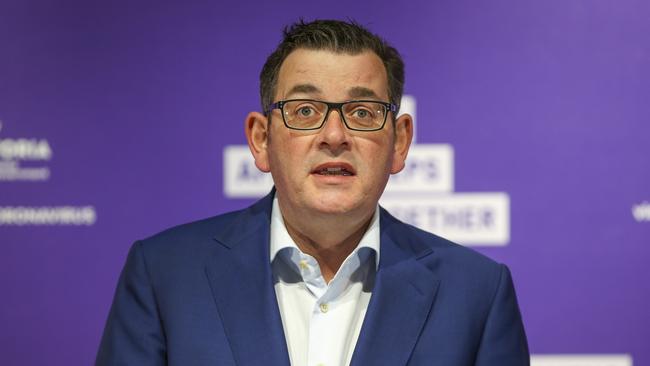Coronavirus: ‘We’re no longer all in it together’
Locked-down residents across Melbourne are feeling isolated, baffled and demoralised about why they’re being targeted.

Locked-down residents across Melbourne are feeling isolated, baffled and demoralised about why they’re being targeted, with families and communities separated because of postcodes.
Hume LGA, which has several of the lockdown postcodes, recorded 18 new cases on Wednesday; with the singling out of areas and a second lockdown, locals have told mayor Carly Moore that they no longer felt Victorians were “all in it together”.
The state government is carrying out a testing blitz in the hotspot suburbs, with 54,000 houses door- knocked since last Thursday.
However, it was revealed on Tuesday that 928 people in the suburbs of Broadmeadows (in the Hume LGA) and Keilor Downs had refused testing.
Ms Moore said she was “devastated” by the decision to return to lockdown. “Realistically, we’re back to square one,” she said on Wednesday.
“I’m hearing from lots of members of the community who really don’t know how they’re going to get through this again.”
She said the area had experienced significant job losses because of COVID-19 in traditional manufacturing and shrinking of the aviation sector.
“This is just going to make it worse,” she said.
“I think there were lots of people who felt the psychological impacts of being locked down and I think those people were really starting to see light at the end of the tunnel and now we can’t see the light any more.”
Ms Moore said many local businesses were already struggling and would be pushed further over the next month, despite the state government providing a $5000 cash payment to businesses previously eligible for a business support fund grant or payroll tax refund.
“I think every little bit will help but $5000 isn’t really a whole lot of money,” she said.
She said she first found out about the lockdown by watching Premier Daniel Andrews’s press conference on Tuesday.
“I don’t think it feels like [we’re all in it together] any more … our community feels like it’s been singled out.”
State Greens MP Tim Read said people affected in his electorate of Brunswick were feeling demoralised and worried that a particular venue or workplace in their postcode was responsible.
“I’ve received dozens of phone calls and messages from people in Brunswick West who are upset and baffled about why their suburb is being locked down,” Dr Read said.
“It will be difficult for many to adjust to these two sets of rules being applied for neighbouring suburbs, but most people want to co-operate, and it’s quite possible more areas will soon have the same restrictions.”
Dr Read, an infectious diseases specialist, said people living in and around the hotspots should maintain social distancing and agree to a coronavirus test if the health department knocked on their door.
“The truth is, the virus doesn’t know how to read a map or single out postcodes,” he said.
Federal Labor member for Wills Peter Khalil said his electorate contained people at higher risk of being infected because of their work.
He said there were areas of disadvantage in the electorate, and many workers had essential frontline jobs, whether as healthcare workers, emergency services, distribution workers or as staff in the supermarket.
“The reason that so many more fortunate people have been able to keep their jobs and work from home is these frontline workers,” he said.
“I don’t like that kind of blaming people [for the spread of the virus], because of a particular group of people.”
Mr Khalil said there had been federal-level conversations about second spikes of the virus since early in the year.
“People need to think about the alternative course of action,” Mr Khalil said.
“I hope [the lockdown] works. I hope going this hard, the state response of going this hard and really aggressive testing … that it works to really suppress the virus from this outbreak.”



To join the conversation, please log in. Don't have an account? Register
Join the conversation, you are commenting as Logout